牛津译林初中英语七下Unit2 Neighbours Welcome to the unit课件
牛津译林 初中英语七年级下册第二 单元Welcome to the unit(共25张PPT)

What is their job?
postman
in the post oFra bibliotekficeThey are postmen.
company
Make a dialogue
A: Who is your neighbour? B:…is my neighbour. A:What’s your neighbour?/
20 2. What does Simon have around his neighbourhood?
supermarkets a school
restaurants a hospital
Read and answer
1.Where is Simon's flat? It's in City Garden in Nine Street.
7B Unit 2 Neighbours
Welcome to the unit
They are neighbours. /’neibə/
New neighbours
Where’s Hobo going?
He’s going to visit his new neighbours.
Read and complete
Neighbours
A near neighbor is better than a distant cousin.
远亲不如近邻。
We should get on well with our neighbours and help each
other .
Homework: Recite the dialogue
2.How many floors do the buildings have? Most of them have 14 floors.
牛津译林版英语七下Unit 2《Neighbours》(welcome to the unit)教学

牛津译林版英语七下Unit 2《Neighbours》(welcome to the unit)教学设计一. 教材分析牛津译林版英语七下Unit 2《Neighbours》主要讨论了与邻居相关的日常交流用语。
通过本单元的学习,学生将能够掌握与邻居交流的基本用语,描述邻居的特点以及日常生活中与邻居的互动。
本单元主要包括以下几个部分:welcome to the unit、read and write、listen and say、look and say、task、self-check以及word bank。
二. 学情分析学生在进入七年级下学期时,已经具备了一定的英语基础,能够进行简单的英语听说读写活动。
但部分学生对于日常英语交流仍感到困难,特别是在实际应用中,可能出现表达不准确或胆怯的情况。
因此,在教学过程中,需要关注学生的个体差异,鼓励他们积极参与课堂活动,提高他们的自信心。
三. 教学目标1.知识目标:学生能够掌握与邻居交流的基本用语,描述邻居的特点以及日常生活中与邻居的互动。
2.能力目标:学生能够在实际情景中运用所学知识进行日常英语交流,提高他们的口语表达能力。
3.情感目标:学生能够学会尊重他人,培养良好的邻里关系。
四. 教学重难点1.重点:学生能够掌握与邻居交流的基本用语,描述邻居的特点以及日常生活中与邻居的互动。
2.难点:学生在实际情景中运用所学知识进行日常英语交流,特别是听力和口语能力的运用。
五. 教学方法1.情境教学法:通过设置各种与邻居相关的实际情景,让学生在情境中学习与练习英语。
2.交际教学法:鼓励学生积极参与课堂互动,进行真实的英语交流。
3.任务型教学法:通过完成各种任务,让学生在实践中运用所学知识。
六. 教学准备1.教师准备:提前熟悉教材内容,了解学生的学习情况,设计合理的教学活动和任务。
2.学生准备:预习教材内容,了解本单元的学习目标。
七. 教学过程1.导入(5分钟)教师通过提问方式引导学生回顾上一单元学到的内容,如家庭成员的称呼和特点。
2013春牛津译林版七下《Unit2 Neighbours》(Welcome to the Unit)ppt课件
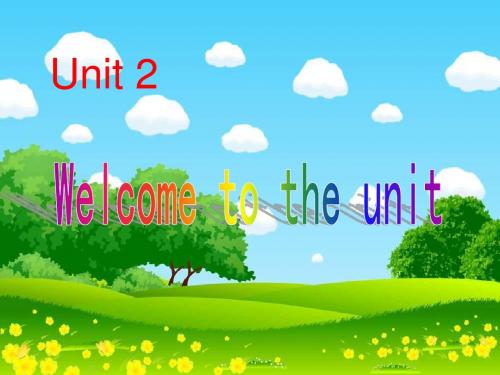
How to be a good neighbour?
polite A good neighbour should be… warm-hearted
Writing Competition征文比赛
My Good Neighbours
Name Jobs Personalities (个性) Things often do
Good neighbours can make our lives better! Good neighbours can make our lives easier! Good neighbours can make us happier! Let's try to be good neighbours!
Sandy nurse
… …
kind
…
…
… …
Simon teacher helpful
I have many good neighbours. ___________________ _____________________________________________ _____________________________________________ _____________________________________________ _____________________________________________ I love my neighbours very much.
Tina
postman 邮递员
Peter
waiter
服务员
A: What isDr. …? Wang B: He/She is a ….
Mr. Wang
牛津译林版七年级英语下册《Unit2Neighbours》Welcometotheunit教案

《Unit 2 Neighbours》Welcome to the unit教案授课时间:年月日总计:课时教学目标:1. .Master the names of all kinds of jobs and working places.2. .Can talk their own towns in English.Teaching contents:Words: neighbour will visitor like wow waiter neighbourhoodSentences: I’m going to visit our neighb ours.教学重点:Words and phrases教学难点:Write sentences about what will do课时安排: 1 课时教学过程:复备栏Ⅰ. Step 1. review①In the afternoon, my family wil l watch a film in a andhave a big meal in a famous .What a wonderful weekend! Now it is time to go to the tobuy something for tomorrow.2. T: Where do you live? What kind of home do you have? What’saround your home? Is your home near a park/a school/a re staurant/a supermarket?Is there a shop/a factory/a cinema/a museum/ahospital near your home? Encourage the students to answer bythemselves.Step2. Presentation1.T: Who lives next to your flat/house? Who lives above/blow you?Who’s your n eighbour? Wha t’s your neighbour? What’s yourneighbour’s name? What does he/she do?Write ‘neighbour’ on the blackboard.2.T: Mr. Lin is my neighbour. He’s a waiter in a big restaurant. Miss Huang lives above me. She’s a teacher.Write ‘waiter’ on the blackboard.Step 3. Practice1.Ask the students to finish exe rci se A.T: We have a lot of neighbours. They have different jobs. Look at the pictures. Where do they work? Please match them with the places. 2.Make a dialogue with a student.Step 4. Presentation1.Make sure the understand the idea of the dialogue B.T: Amy is asking Simon questions. What are these questions about? Please listen to the tape and tell me.2.Encourage the students to the tape and answer.T: The questions are a bout Simon’s home and different places a round his flat.Present ‘neighbourhood’ and write it.Step5.Practise1.Play the tape ,ask the students to answer more questions. eg:(1)Where’s Simon’s flat?(2)How many buildings are there in neighbourhood?(3)How many floors do the buildings have?(4)What does Simon have around his neighbourhood?(5)What does Simon think of his neighbourhood?2.Divide the students into two groups to read.3.Ask some students to make a dialogue using part B as a model.4.Ask some students to act.Step 6. Presentation1.T: Do you often talk with our neighbours? Do you often play withyour neighbours? Do you like visiting them? Do they often visit your home? Do you thin k they’re good visitors? What do you think your neighbours?Write ‘visitor’ on the blackboard.2.ask the students to listen to the t ape and find the answer:Where’sHobo going?3.ask the students to answer more questions according to the tape. Step7.PractiseAsk the students to read the dialogue and act.Step8. Presentation1.Encouage the students to say their ideas acco rding to the comicstrip.2.Arrange the students to talk about and discuss:Wh at can you dofor your neighbours?Step9.Homework1.Remerber all the new words and sentences.2.Ricite the dialogue and part B.3.Finish the exercise.教学反思:。
译林牛津版7下 unit2 welcome to the unit (共19张PPT)

I think he eats a lot of food.
Read and act
Where is Eddie’s dream home?
In a palace?
Next to a restaurant?
My dream neighbourhood is like a star.
There are many green trees and beautiful flowers. There are only 6 buildings in it. Each building has 3 floors. I live in the centre of my neighbourhood.
We have a supermarket, a hospital, a cinema, a school and a restaurant around it.
What about your
Work in groups of 4, and design your dream
?
neighbourhood.
Read after the tape sentence by sentence.
It’s your time to talk about
your neighborhood!
A: Where do you live, …? B: I live in … A: How many buildings/houses are there in your neighborhood? B: There are about … buildings/houses. Most of them have …floors. A: What do you have around your neighborhood? B: We have … A: Do you like living there? B: Yes. … / No. Because …
牛津译林 初中英语七年级下册第二 单元Welcome to the unit(共25张PPT)
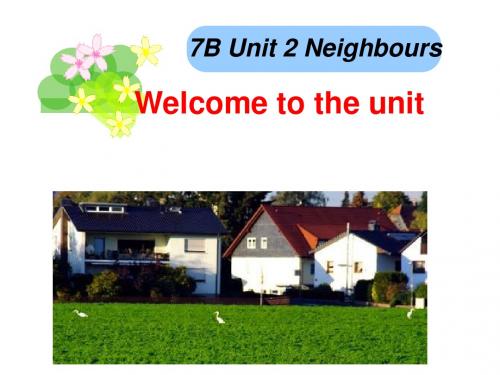
supermarkets a school
restaurants a hospital
Read and answer
1.Where is Simon's flat? It's in City Garden in Nine Street.
between Hobo and Eddie.
To learn more about Simon’s neighbours.
7B Unit 2 Neighbours
Welcome to the unit
They are neighbours. /’neibə/
New neighbours
Where’s Hobo going?
He’s going to visit his new neighbours.
Read and complete
What is their job?
postman
in the post office
They are postmen.
company
Make a dialogue
A: Who is your neighbour? B:…is my neighbour. A:What’s your neighbour?/
What are they? a waiter three waitresses
People and places
nurse
a hospital doБайду номын сангаасtor
People and places
teacher
student
译林版牛津版英语七年级下册Unit2 Welcome to the unit课件
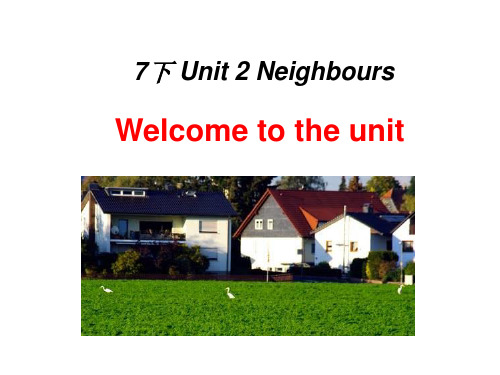
5.It is +adj. to do sth. 做某事…
• • • • 努力学习很重要。 It is important to study hard. 长时间玩电脑游戏不好。 bad ____ to play computer games for a long It is _____ time. • 这个问题很容易回答吗? Is it very easy to • ________________answer this question?
Activity
Act it out
Try to make it longer and interesting!
Useful expressions
• 1.我恐怕… • 2.像你这样的拜访者 I am afraid…
visitors like you
• 3.他们中的大多数
• 4.做…不错 • 5.就像那样的
• • • •
介词 反义词:unlike Like 介词 “像…” He is unlike you, he likes dancing. Like 动词 “喜欢” 动词 反义词:dislike He is like you, he also dislikes sports.
2.关于visitor
postman in the post office They are postmen.
farmer
on a farm
office worker
in an office
driver
What does he do every day?
He drives a taxi.
a doctor
two nurses
neighbour(s)
精品赛课课件 牛津译林版七年级英语下Unit2 Neighbours Welcome to the unit课件(共22张PPT)
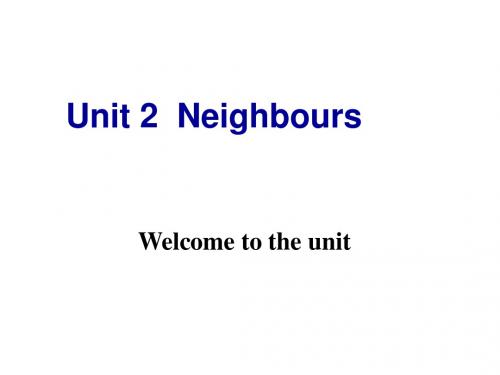
4. Is your home near a park/a school/a
restaurant/a supermarket?
5. Is there a shop/a factory/a cinema/a
museum/a hospital around your home?
Enjoy some photos, which one do you like?
Language Points
1. I’m going to visit our new neighbours. I’ll meet them, too. be going to do sth. 和 will do sth. 都 是一般
将来时态的动词结构。前者的be动词需要 依据句子主语的人称或单复数来确定am, is或are, 而后者的will则不需要变化。 e.g. Students are going to go for a school trip
People and places
A Where can you find these people? Match them with the places. Write the correct letters in the boxes.
c
b
b a
a c
B Amy is asking Simon about his neighbourhood. Work in pairs and talk about your neighbourhood. Use the conversation below as a model.
A good neighbour is better than a brother 远亲不如近邻。 in the next village.
2016春牛津译林版英语七下Unit 2《Neighbours》(Welcome to the unit)ppt课件

Listen to the tape and fill in the blanks.
Simon lives in a (1) ___ in City Garden in Ninth Street. There are about (2) ___ flat buildings in his (3) ______________. Most of them have (4) ___ floors. It’s (5) _____ for Simon and his neighbours to live there, because there are 20 some supermarkets, (6) __________, a school and a (7) _______. neighbourhood 14 good
1. What can you see in the pictures? 2. Can you tell me something about each picture?
1. neighbour
n. 邻居
Our neighbours are very warm. 我们的邻居非常热情。
2. will
restaurants
hospital
Listen to the tape again and answer the questions.
Where’s Simion’s flat? It’s in City Garden in Ninth Street. 2. How many buildings are there in his neighbourhood? About 20 building. 1.
牛津译林版七年级下册Unit 2《Neighbours》(Welcome to the unit)课件
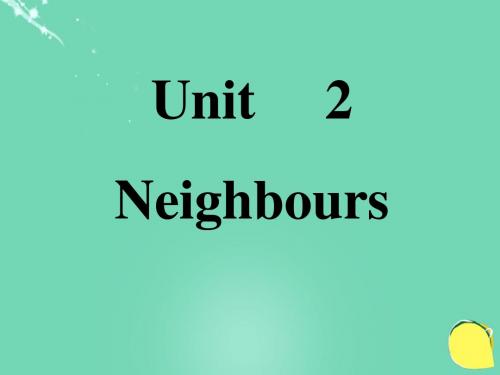
About 20buildings.
How many floors do the buildings have?
Most of them have 14 floors.
Read and answer
What does Simon have around his neighbourhoods?
Supermarket, restaurants, a school and a hospital. What does Simon think of his neighbourhood?
school
farmer
on a farm
office worker
in an office
actor/actress
theatre
police station
Pair work A: What is he?/What does he do? B: Where does he work?
cook
5. My uncle is a c______. He works in a restaurant. ook
6. The w____ aiter works in a fast food restaurant. hoppersin the shopping mall on 7. There are many s______ Sunday.
I’m afraid they won’t welcome visitors like you.
恐怕他们不好欢迎像你这样的客人。
I’m afraid 恐怕,口语表达习惯
恐怕明天要下雨了。 I’m afraid it is going to rain tomorrow. 恐怕我妈妈没有时间陪我玩了。 I’m afraid my mother has no time to play with me.
【最新】牛津译林版七年级英语下册Unit2 welcome to the unit教学课件
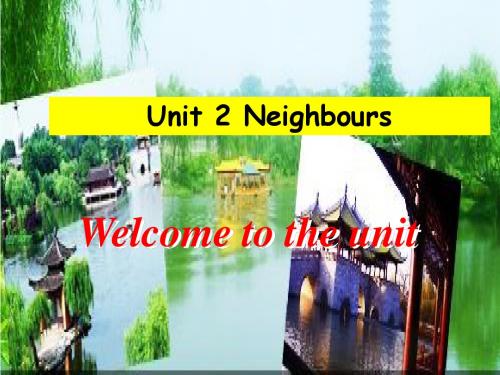
Homework
1.Copy the new words 2.Recite the dialogue 3.Do exercises on the workbook
go shopping for old people Say h ello to each other Try to be honest often smile don’t say bad words abou t others r
Neighbours
A near neighbor is better than a distant relative. 远亲不如近邻。
a doctor
a nurse in a hospital
postman
in the post office
a farmer
on the farm
Guessing game
farmers
worker
driver
cooks
Task 2 read and answer
1. Where’s Simon’s flat?
4. What does Simon have around his neighbourhood? Supermarkets,restaurants,a school and a
hospital.
He thinks it’s Simon good to live of in a neighbourhood like that. 5. What does think his neighbourhood?
It’s in City Garden in Ninth Street.
牛津译林初中七年级下册英语Unit 2 Neighbours》Welcome to the unit

Answerthequestionsaccordingtothe video. 1. WhereisHobogoing?
Heisgoingtovisithisnewneighbours. 2. What’sEddiegoingtodo?
Heisalsogoingtomeethisnewneighbour s.
3. WilltheneighbourswelcomeEddie? Why? I’mnotsure. ButHoboisafraidthattheneighbours won’twelcomeEddie.
AWherecanyoufindthesepeople? Matchthemwiththeplaces. Writethecorrectlettersintheboxes.
c
b
a
b
a
c
BAmyisaskingSimonabouthisneigh bourhood. Workinpairsandtalkaboutyourneig hbourhood. Askyourpartnerandanswerthequest 1. Wionhse.redoyoulive?
Workwithyourparenter. Makeadialoguelikethisone.
A:Wheredoyoulive? B:Ilivein... A:Arethereanybuildingsaroundyourne ighbourhood? B:...
牛津译林版七年级Unit2 Neighbours Welcome to the unit课件
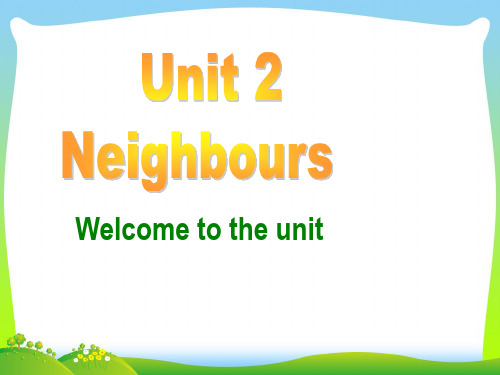
Welcome to the unit
Visit a new neighbour
house-warming gift 暖屋礼物;乔迁贺礼
➢ To learn to talk about the people and places
➢ To learn to talk about your neighbourhood
1. What’re the meanings of these words? waiter, doctor, teacher, nurse, student, cook
2. Pay attention to these sentence patterns. I’m afraid … How many … are there? It’s good to …
13、He who seize the right moment, is the right man.谁把握机遇,谁就心想事成。2021/8/12021/8/12021/8/12021/8/18/1/2021
▪ 14、谁要是自己还没有发展培养和教育好,他就不能发展培养和教育别人。2021年8月1日星期日2021/8/12021/8/12021/8/1
Words review neighbour n. <英>邻居学科网 zxxk
wow
will visitor
like waiter neighbourhood
<美>neighbor excl. 哇,呀 modal v. 将,将会 n. 访问者,参观者 prep. 像,类似;…怎么样
n. (餐馆等的)服务员
Amy: Where do you _l_iv_e_, Simon? Simon: I live in a _f_la_t_ in City Garden in
牛津译林初中英语七下Unit2NeighboursWelcometotheunit课件

It’s good to live in a neighbourhood like that.
第十六页,共17页。
汇报结束
谢谢大家! 请各位批评指正
A: What do you think about your neighbours?
B: They are very h_e_l_p_fu_l_ and kind. A: Do you often say h_e_l_lo____ to each other
when you meet each other? B: Yes, of course.
第十七页,共17页。
6. They make delicious food for people in restaurants. cook
7. They can take you anywhere you want to go by taxi. driver
第八页,共17页。
neighbourhood n.neigh Nhomakorabeaour n.
3. What do they have around their neighbourhood?
They have supermarket, restaurant, a school and a hospital.
第十页,共17页。
Listen and answer
1. Where is Hobo going?
第二页,共17页。
➢ To learn about jobs and workplaces ➢ To learn to talk about neighbours
牛津译林版七年级英语下册 Unit 2 Neighbours welcome to the Unit课件

We should get on well with each other and help each other .
Homework
1.Copy the new words 2.Recite the dialogue 3.Do exercises on the workbook
Unit 2 Neighbours
Welcome to the unit
Task 1 jobs and places
What does he do? Where does he work?
a cook
in a restaurant
a waiter a waitress
a teacher students in a school
Task 3 Practice
A: Where do you live? B: I live in… A: How many buildings are there in your neighbourhood? B: There are about…..Most of them have--floors. A: What do you have around your neighbourhood? B: We have… A: Do you like living there? B: …
Task 4 read and answer
Where are you going?
1. Where is Hobo going? He’s going to his neighbour’s home.
2. Does Eddie want to go with Hobo? Yes, he does.
a doctor
牛津译林版七年级下册英语Unit 2 Neighbours Welcome to the unit课件

• We w__o_n_’_t _p_la_y___computer games.
A near neighbour is better than a distant cousin.
Homework
• 1.Learn the new words by heart after class.
a supermarket
a park
Amy is asking Simon about his neighbourhood. Listen to their dialogue and answer the questions:
1.Does Simon live in a house?
No, he lives in a flat.
我明年将会有自己的卧室了。
I will have my own bedroom next year.
下个礼拜我们将会举行一个派对。
We will have a party next week.
3. 恐怕他们不会欢迎像你这样的来访者。 I’m afraid they won’t welcome visitors like you.
• 2.Recite the dialogs. • Introduce your neighbours to your
deskmate.
他明天不打算早起。
He isn’t going to get up early tomorrow.
你打算晚饭后做作业吗?
Are you going to do your homework after dinner?
2. 我也将见见他们。
I’ll meet them too. I’ll = I will 将,将会
牛津译林版英语七年级下册Unit 2 Neighbours Welcome to the unit
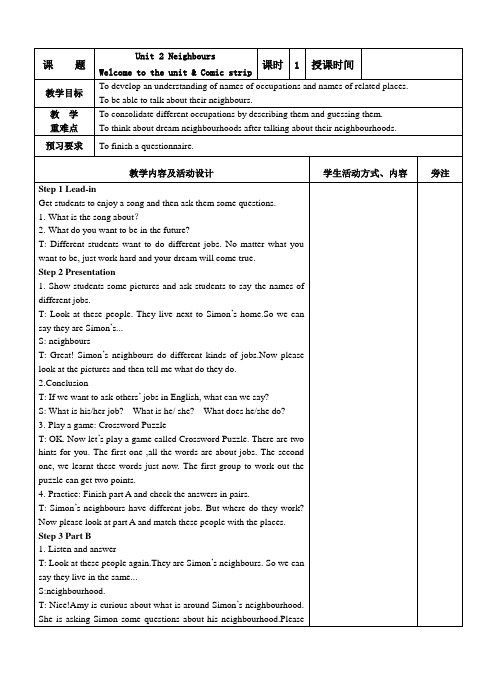
T: Simon’s neighbours have different jobs. But where do they work? Now please look at part A and match these people with the places.
2.Conclusion
T: If we want to ask others’jobs in English, what can we say?
S: What is his/her job? What is he/ she? What does he/she do?
3.Play a game: Crossword Puzzle
教学
重难点
To consolidate different occupations by describing them and guessing them.
To think about dream neighbourhoods after talking about their neighbourhoods.
3.Read and fill
4.Read and act
5.Explain some language points
6.Feedback exercises
7.Discussion: Do you want to be a good neighbour?
How to be a good neighbour?
Step 5 Homework:
Finishtheschool paper
Recitethe Comic strip.
- 1、下载文档前请自行甄别文档内容的完整性,平台不提供额外的编辑、内容补充、找答案等附加服务。
- 2、"仅部分预览"的文档,不可在线预览部分如存在完整性等问题,可反馈申请退款(可完整预览的文档不适用该条件!)。
- 3、如文档侵犯您的权益,请联系客服反馈,我们会尽快为您处理(人工客服工作时间:9:00-18:30)。
Words review
neighbour n. <英>邻居 <美>neighbor wow excl. 哇,呀 will modal v. 将,将会 visitor n. 访问者,参观者 like prep. 像,类似;…怎么样 waiter n. (餐馆等的)服务员 neighbourhood n. <英>街区,居民区 <美>neighborhood
He likes baseball. 他喜欢棒球运动。 He’s very like his father. 他很像他的父亲。 She’s wearing a dress like mine. 她穿的连衣裙和我的一样。
1. What’re the meanings of these words? waiter, doctor, teacher, nurse, student, cook
Amy: What do you have _______ around your neighbourhood? Simon: We have supermarkets, __________, a school and a restaurants hospital. Amy: Do you like ______ living there? Simon: Yes. It’s _____ good to live in a neighbourhood like that.
2. Pay attention to these sentence patterns. I’m afraid … How many … are there? It’s good to …
To preview Reading on Page 20
To learn more about Simon’s neighbours. To preview the new words
Write a conversation between you and one of your friends. You can talk about your neighbourhood.
I’m afraid they won’t welcome visitors like you. Do you like living there? Yes. It’s good to live in a neighbourhood like that. 从以上三句话中可以看出like既可以是 动词,意思是“喜欢”,也可以是介词, 意思是“像,类似;像……一样”。
Welcome to the unit
Visit a new neighbour
house-warming gift 暖屋礼物;乔迁贺礼
To learn to talk about the people and places To learn to talk about your neighbourhood
After you listened to Eddie and Hobo’s conversation, answer the questions: 1. Where is Hobo going? He is going to visit their new neighbours. 2. Does Eddie want to go with Hobo? Yes, he does. 3. What does Hobo worry about? He is afraid their new neighbours won’t welcome visitors like Eddie.
People
Places
Where can you find these people?
Match them with the places. Write
the correct letters in the boxes.
c
b
a
b
a
c
Listen to Amy and Simon’s conversation. Amy: Where do you ____, live Simon? Simon: I live in a ____ flat in City Garden in _____ Street. Ninth Amy: How many buildings are there in neighbourhood your ______________? Simon: There are about 20 buildings. Most of them have 14 __ floors.
Talk about your neighbourhood. A: Where do you live? B: I live in ... A: How many buildings are there in your neighbourhood? B: There are about … buildings. A: What do you have around your neighbourhood? B: We have … A: Do you like living there? B: Yes. It’s good to live in a neighbourhood like that.
